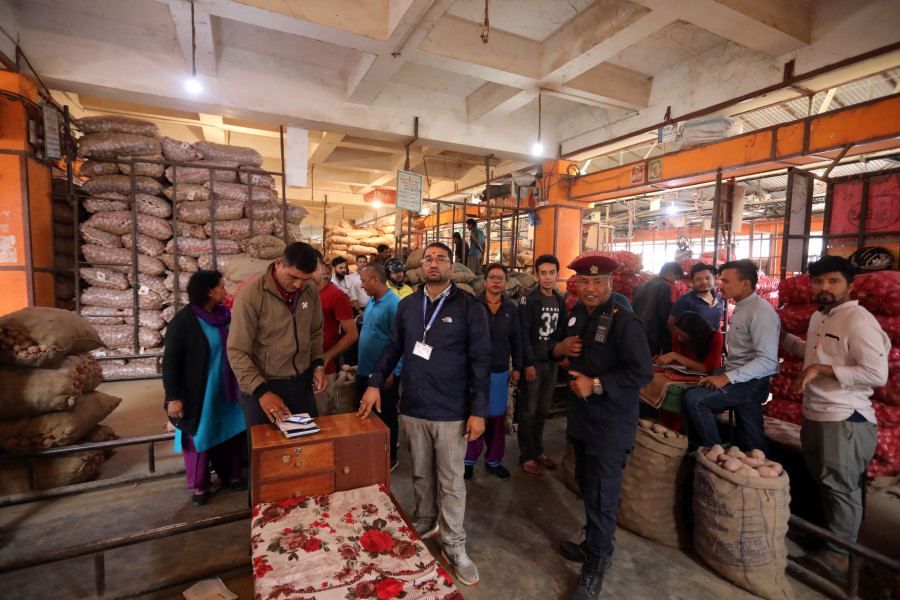Money
Doubts raised over implementation of new market monitoring procedure
Consumer rights activists and traders cite the government's failure to implement such regulations effectively in the past.
Krishana Prasain
Consumer rights activists and retailers have questioned the government’s capacity to implement the new market monitoring procedure recently unveiled by the Ministry of Industry, Commerce and Supplies for public feedback.
The Market Monitoring Procedure 2020, which came out earlier this week, is designed to protect consumers and will require businesses to follow certain quality standards.
“This is just to show that a process has been fulfilled as provisioned in the Consumer Protection Act and its regulations, but it may not be effectively implemented,” said Madhav Prasad Timilsina, president of the Consumer Rights Investigation Forum.
“If the government had implemented the regulations effectively, there would be no need for this procedure.”
According to Sagar Mishra, director of the Department of Commerce, Supplies and Consumer Protection, the procedure has provisions that are not included in the Consumer Protection Act 2018.
“Once the procedure comes into effect, it will make market regulation more manageable and effective,” said Mishra.
But consumer rights activists say they are not very hopeful about the new procedure, judging by the past performance of the department.
“People had high hopes that the passage of the Consumer Protection Act 2018 would make the market fair, competitive and consumer friendly,” Timilsina said. “But nothing like that has happened. Issues like the involvement of layers of middlemen in the vegetable trade continues.”
The Market Monitoring Procedure 2020 and the Market Monitoring Regulation 2020 have been approved by the Central Marketing Monitoring Committee, which is chaired by the secretary of the Ministry of Industry, Commerce and Supplies and consists of representatives from various ministries and departments.
The committee is currently seeking feedback from stakeholders. The document will be sent to the cabinet for approval, and its implementation will be proclaimed through the Nepal Gazette.
According to Mishra, market inspection is currently being conducted on the basis of the Joint Market Inspection Procedure 2010.
The new regulation will require mandatory quality checks and Nepal Standard certification for goods. The packaging label should also clearly mention what is inside the package, its quantity and the symbol number of the product that the department has given.
Failure to adhere to these rules could lead to a jail term of three months to five years, and a fine ranging from Rs50,000 to Rs600,000.
Inspection teams can shut down a firm for violating the law, and it will be allowed to resume operations only after a re-inspection.
A company that has been charged with flouting regulations can apply for a retest by providing a sealed sample of the product in question for laboratory verification.
Traders may be fined on the spot, and this may be communicated through telephone, fax or other electronic media, or through letters.
The rule also empowers the inspection chief to take the accused into custody if he or she tries to escape, destroy evidence or obstruct the investigation process.
The department is short staffed with only 20 market inspectors, and they rarely venture out of the Kathmandu Valley.
The department had recently asked the Ministry of Industry, Commerce and Supplies for another 20 inspectors, but its request was turned down.
“So there is no possibility of appointing new manpower immediately,” said Netra Prasad Subedi, director general at the department. But he added that the new procedure empowers provincial and local governments.
“Provincial and local governments and district administrations can also be given the authority to conduct market inspection,” said Subedi. “We have already written to the 77 district administrations in this regard.”
Although Subedi claims the new procedure and regulations will make the monitoring system more systematic and limited, consumer rights activist Timilsina has his doubts.
“If the rules were not being implemented according to the Act, there is no hope for the implementation of the procedure and regulation either,” Timilsina said. “The issue of maintaining quality in consumer items has been talked about for 10 years, but it has not happened yet.”
Officials may conduct raids on businesses, but they must be accompanied by the police and local representatives or residents, according to the new procedures.
If any member of the inspection team has a conflict of interest, he or she should inform the supervising officer in advance.
The Central Market Monitoring Committee has endorsed the Market Monitoring Procedure 2020, and it has been made public for feedback and suggestion, Subedi said.
Traders are also sceptical about the new procedures being effective.
“While conducting market inspection, there is lack of coordination between different government agencies; and as a result, officials get confused and the outcome is not as effective as expected,” said Raj Kumar Shrestha, president of the Nepal Retailers Association.
“Only time will tell whether the new procedure and regulation will be actually implemented or they are only for show,” Shrestha said.




 9.6°C Kathmandu
9.6°C Kathmandu















